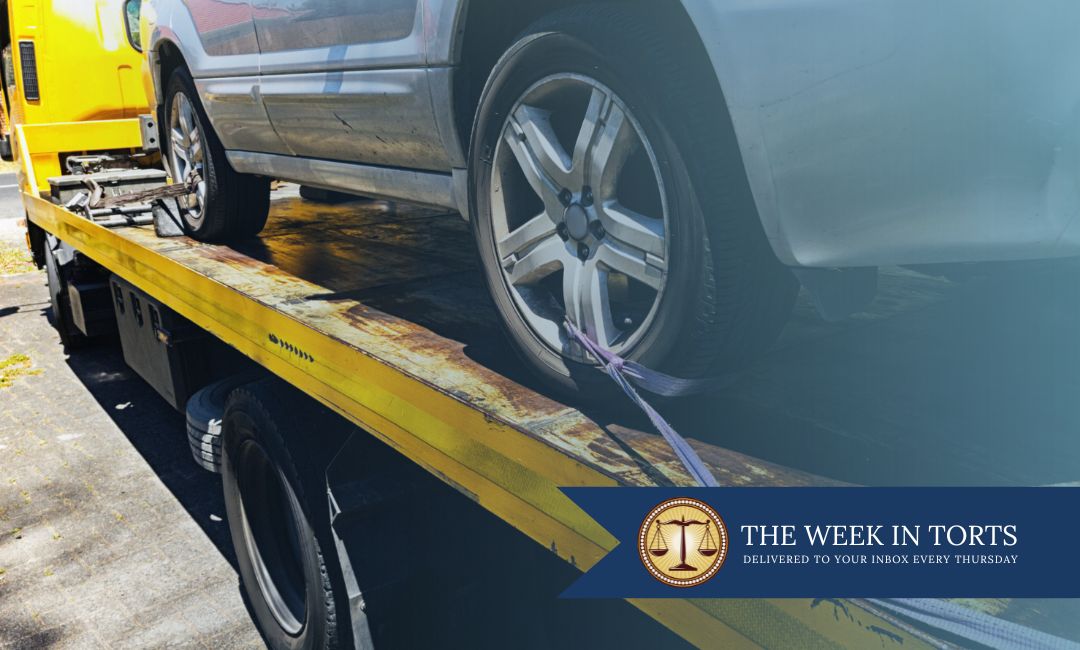The Week In Torts – Cases from July 28, 2023

I should have done more
FLORIDA LAW WEEKLY
VOLUME 48, NUMBER 30
CASES FROM THE WEEK OF JULY 28, 2023
PARTY FAILED TO PRESERVE CAUSE CHALLENGE TO OBJECTIONABLE JUROR—CLIENT GETS CONVICTED
O’Brien v. State, 48 Fla. L. Weekly D1417 (Fla. 4th DCA July 19, 2023):
In this criminal DUI case, the court opened its opinion by noting that the appeal turned on one word: “preservation.”
There were three jurors that the defendant asserted the trial court erred in addressing.
The first juror stated that she would give law enforcement the benefit of the doubt because she had been in law enforcement for 30 years. She advised she had “a lot of faith in law enforcement.”
After stating that she would give law enforcement the benefit of the doubt and would have a tough time not believing what the officer said, and after revealing that her husband was currently a federal agent and she had many close friends in law enforcement, the trial court denied the cause challenge stating that the juror had been rehabilitated when she said she would wait to hear the testimony. The defense did use a peremptory challenge to strike her.
After the panel was selected, instead of accepting the panel, the defense attorney asked for an additional peremptory strike to use against another juror because of that juror’s positive experiences with law enforcement. The state responded that one interaction with a police officer was an insufficient reason to strike her. The trial court then denied the defense counsel’s request for the additional peremptory.
Finally, the state used one of its peremptory strikes against a third juror – – an African American man who advised that he gets “pulled over for a lot of bogus reasons.” Upon being asked whether he believed all police officers were bad, the juror said he did not believe that and it depends on the person.
When the state sought to strike this man with a peremptory challenge, the defense asked for a race neutral reason. The state advised that there would be concerns that this juror would be biased against law enforcement because has been pulled over for no reason.
Defense counsel asserted such a reason could not be “race neutral” under the circumstance of an African American man believing he repeatedly gets pulled over for bogus reasons. The defense attorney asserted that the juror was articulating a racial basis for why he has gotten pulled over. The judge again accepted the state’s reason as race neutral and allowed the strike.
In making these challenges on appeal, the state asserted that they were not preserved.
To prevent a waiver when a juror gets challenged, the opponent must again call the court’s attention to any objections before the jury is sworn. This is done either by renewing the challenge, or by accepting the juror subject to an earlier objection.
Additionally, to preserve a denial of a challenge to a juror for cause, it is necessary that the party exhaust all remaining preemptory challenges, request additional preemptory challenges, and identify to the trial court which juror the party would have stricken had the preemptory challenges not been exhausted.
The record revealed that after the trial court denied the defendant’s request for an additional peremptory strike to use against the second juror, the defendant accepted the jury including the second juror without renewing his motions or explicitly accepting the jurors subject to his request to exercise a cause challenge on the first juror and an additional peremptory strike on the second juror. The defendant only renewed his objection regarding the third juror by making arguments as to jurors one and two.
Immediately before the defense agreed to accept the panel, counsel advised it was subject to only one prior objection, specifically the striking of the third juror.
In this instance, the trial court did properly follow the Melbourne process with the state making its strike, the defendant asking for a race neutral reason, the state giving such a reason, and the trial court determining that the reason was not pretextual.
As the party opposing the strike, the defendant had the burden to prove purposeful race discrimination and was required to challenge the genuineness of the state’s proffered race neutral reason and to make a specific objection to the reason.
The defense did not do so. He claimed that the state’s reason was not race neutral given the state of our society over the policing of minority areas, but the state responded that was not a legal argument. The trial court asked the state whether it was alleging that the juror was indiscriminately pulled over because of his race, the state answered no. The state was concerned that the juror would be biased against the police because of repeatedly being pulled over.
At that point, the defendant did not challenge the state’s proffered race neutral reason and did not place the trial court on notice that he was contesting the factual existence of the reason. The court also found that the defendant waived his objection to the third juror by failing to object to the genuineness of the state’s reason.

